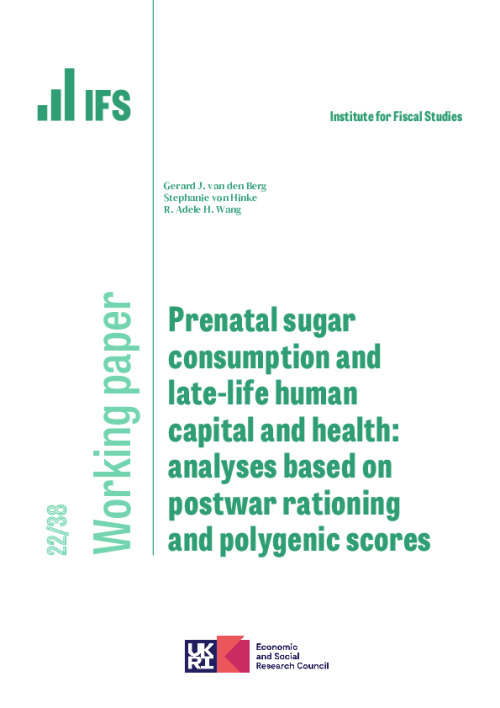Maternal sugar consumption in utero may have a variety of effects on offspring. We exploit the abolishment of the rationing of sweet confectionery in the UK on April 24, 1949, and its subsequent reintroduction some months later, in an era of otherwise uninterrupted rationing of confectionery (1942-1953), sugar (1940-1953) and many other foods, and we consider effects on late-life cardiovascular disease, BMI, height, type-2 diabetes and the intake of sugar, fat and carbohydrates, as well as cognitive outcomes and birth weight. We use individual-level data from the UK Biobank for cohorts born between April 1947–May 1952. We also explore whether one’s genetic predisposition to the outcome can moderate the effects of prenatal sugar exposure. We find that prenatal exposure to derationing increases education and reduces BMI and sugar consumption at higher ages, in line with the “developmental origins” explanatory framework, and that the sugar effects are stronger for those who are genetically predisposed to sugar consumption.
Authors

Gerard Van Den Berg
Research Fellow University of Bristol
Stephanie is a Reader in Economics at the University of Bristol and an Endowed Professor of Health Economics at Erasmus University Rotterdam.
Honorary Research Associate University of Bristol
Working Paper details
- DOI
- 10.1920/wp.ifs.2022.3822
- Publisher
- Institute for Fiscal Studies
Suggested citation
G, Van Den Berg and R, Wang and S, von Hinke. (2022). Prenatal sugar consumption and late-life human capital and health: analyses based on postwar rationing and polygenic scores. 22/38. London: Institute for Fiscal Studies. Available at: https://ifs.org.uk/publications/prenatal-sugar-consumption-and-late-life-human-capital-and-health-analyses-based (accessed: 30 June 2024).
More from IFS
Understand this issue

Conservative Party Conference: Can the next government afford the NHS?

Liberal Democrat manifesto: a reaction
10 June 2024

Retirement is not always a choice that workers can afford to make
6 November 2023
Policy analysis

How do the last five years measure up on levelling up?
19 June 2024

A response to the Conservatives’ proposals to reduce growth in the health-related benefits bill
8 June 2024

Free breakfast clubs in schools: what Labour’s plans would mean for pupils and families
25 June 2024
Academic research

The role of hospital networks in individual mortality
13 May 2024

Forced displacement, mental health, and child development: Evidence from Rohingya refugees
10 May 2024

